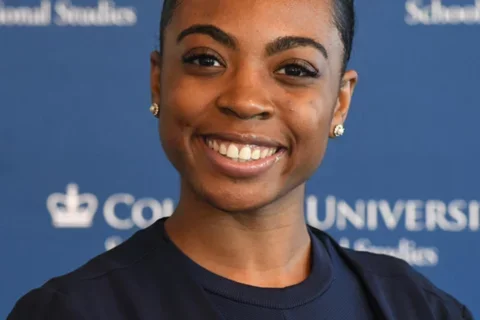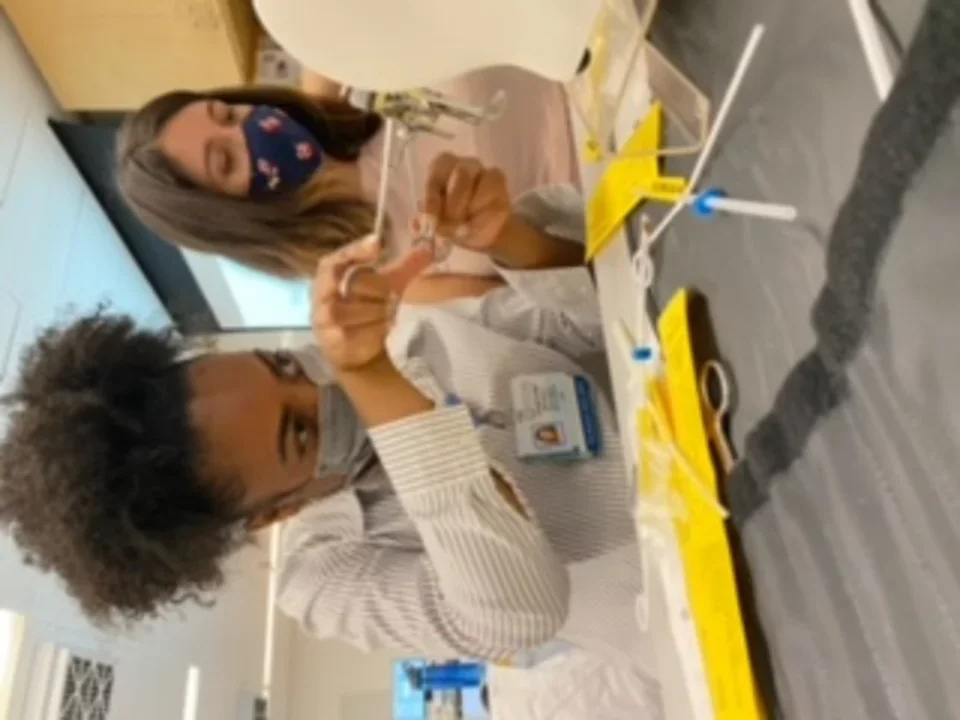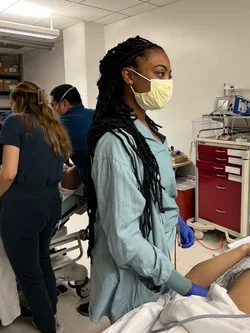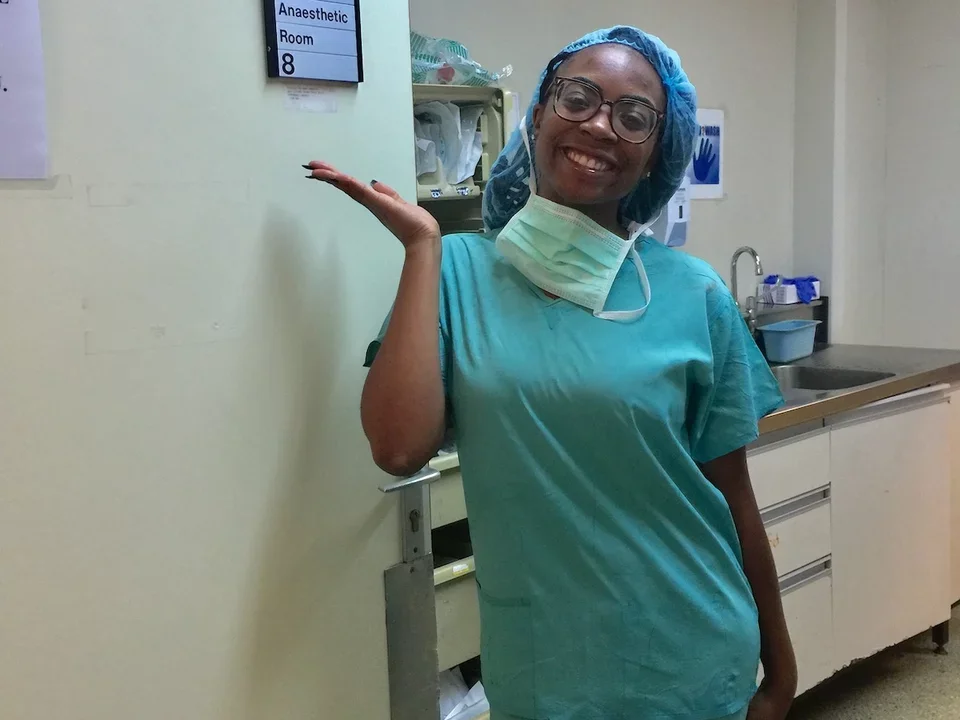Becoming a Bridge Between Minority Communities and Medicine
Student Spotlight

Meet Shami-Iyabo Mitchell
Shami-Iyabo Mitchell’s desire to become a physician is rooted deeply in family and community experiences. Almost everyone she knew growing up in Cleveland, Ohio had misgivings about medicine and the healthcare system.
The fraught history between Black communities and the medical establishment had given them little reason to believe physicians had their best interests in mind.
“When my parents and grandparents experienced any ailments, instead of going to the doctor's office, they would try taking care of things themselves, using naturalistic remedies or just covering things up with BandAids,” Shami recalls.
“That doesn’t work for more serious conditions.”
Her father’s experience with healthcare made that clear. He suffers from a rare and debilitating ear disease. Unable to hear properly, he needed help managing appointments and understanding his condition and his treatment.
Watching what he went through helped Shami see what needed to change and how she could champion that change. She could become the doctor her community needed and deserved—a doctor they could see themselves reflected in.
“I wanted to be a bridge between minority communities and medicine and make healthcare more approachable and accessible to them.”
Fun fact: Shami is an enthusiastic foodie. She keeps lists of restaurants she loves or wants to try in multiple cities, including Los Angeles, Atlanta, New York, and Washington D.C.
Overcoming Challenges to Get into Medical School
Coming from a low-income, underserved background, Shami didn’t have friends or family members who worked in medicine, knew about medicine, or understood how to get into medical school.
“I'm the first woman in my family to go to college,” she says. “I'm going to become the first doctor in my family.”
Shami forged her own path to medical school, a process that involved significant trial and error. She found pre-med programs, such as UCLA’s Pre-Med Enrichment Program (PREP), especially helpful for understanding med-school applications and gaining other tacit knowledge she’d never before had access to.
UCLA’s pre-med program left her with an actionable list of next steps and a vivid image of what life beyond applications could look like.

“During the PREP program, I fell in love with UCLA’s campus, the faculty, and the opportunities.”
She pictured herself attending medical school at UCLA and living in the diverse, vibrant environment that is Los Angeles. She loved what she saw and focused on making it happen.
Now that she understood the logistics involved in pursuing a medical career, finances became her biggest challenge.
While attending Spelman College, she worked multiple jobs to support herself and save enough money to dedicate her summers to working in medical positions that, while unpaid, were crucial to building experience and advancing her career.
After years of hard work and preparation, Shami matriculated at the David Geffen School of Medicine at UCLA (DGSOM) in 2021. Her journey to medical school complete, she eagerly stepped onto the next path stretching before her—the path to becoming a doctor.
Life as a Med Student
Shami’s on DGSOM's Charles R. Drew University (CDU)/PRIME education track. On this track, students earn master’s degrees en route to earning their medical degrees. Shami, who already has a master's of science in bioethics from Columbia University, plans to get her second master’s in business administration (MBA).
A focused purpose—identifying and addressing her own biases before practicing medicine—undergirded her interest in pursuing her first master’s in bioethics. She’s approaching her second master’s with the same precise forethought.
Earning an MBA will help her develop and realize all the ideas she has for streamlining healthcare management and optimizing patient outcomes through systemic changes. She envisions herself being deeply involved in the business and operational side of healthcare on top of her clinical work as a gynecologist and obstetrician (ob/gyn).

Shami arrived at medical school with an interest in pursuing ob/gyn as her medical specialty.
“Bringing life into this world is such an amazing experience,” she says. “It’s so fulfilling—to be close to individuals as they're going through some of the scariest moments in their lives or some of the happiest moments in their lives, depending on the course of their delivery.”
Shadowing ob/gyns and reading research on disparities within the field, specifically how Black women face more and disproportionately negative childbirth outcomes than other groups, first kindled her passion for helping patients.
“I hope to decrease the rates of maternal death and maternal morbidity in this country, especially for Black women,” she says.
The current literature on ob/gyn outcomes bolsters her hope with solid evidence.
“Black women are more likely to survive when they have racial concordance with their physician.”
The more experience she gets in her field of interest, the more certain she feels it’s the right choice for her.
She engaged deeply with ob/gyn research during her Discovery year—a third-year DGSOM medical school curriculum requirement that provides protected time for a substantive creative and scholarly experience in an area of interest.
The experience multiplied her knowledge of specific conditions and gave her space to reflect on—and solidify her commitment to—her ob/gyn career aspirations.
Identifying and Meeting Patient Needs
Reflecting on all the time she’s spent in the clinic throughout her years of training, Shami says one patient experience stands out from the rest.
“During the first encounter, he didn't seem comfortable with our team and the care we were providing,” she says.
The patient had a history of HIV and was suffering from rectal bleeding, a warning sign for rectal cancer. He needed a biopsy.

However, after staying in the hospital overnight, he announced his intentions to check out despite his medical needs and his team’s recommendations. He said he felt like a guinea pig—that he was being put on display.
Shami empathized with his feelings and concerns and decided to talk to him independently.
She wanted to understand more deeply what drove his urge to leave the hospital, knowing that decision could carry significant health consequences. Listening and understanding, she believed, could help her figure out how to make him comfortable enough to stay and receive much-needed care.
The patient explained the root causes of his negative feelings. He didn’t understand why he’d been waiting to undergo surgery for so long. No one had explained the extensive thought and logistical planning behind his care, so to him, the process seemed arbitrary and dehumanizing.
Shami took the time to explain the why behind the care team’s decisions. She elaborated on the challenges of fitting an unplanned biopsy into the hospital’s packed surgery schedule.
Shami’s instincts, her ability to see and fulfill the deep need behind all his complaints, turned the situation around. Understanding more about everything happening to him provided the safety and comfort he needed.
“He ended up staying that day to receive his biopsy and find out if he had rectal cancer,” Shami says.
Never Let Circumstances Limit Your Potential
From improving healthcare management to reducing maternal death and morbidity, most of Shami’s career goals are highly specific and strategic. She also holds a more general goal close to her heart.
“I’ve struggled with not seeing many providers who look like me within the field I want to go into,” she says. “I want to be a welcoming face and encourage young Black individuals to pursue their dreams in the field of medicine.”
She has an inspirational message for these aspiring physicians and scientists.
“No matter your circumstances, this is an attainable opportunity for you,” she says. “These spaces are meant for you, and you can excel in them, even if they’ve never represented you.”
Mentorship helped Shami understand that she could, and how she could, enter unfamiliar and unexplored territory.

“Look for mentors who’ve done what you’re trying to do,” she advises. “Let their experiences inform the roadmap that clarifies your path forward.”
When Shami thinks about the circumstances from which she launched her medical journey, she appreciates how incredibly far she’s come. Using what she’s learned to help her family move beyond their reservations about medicine and take control of their health makes her feel especially proud.
“Being in medicine has transformed how I connect to my family and friends.”



